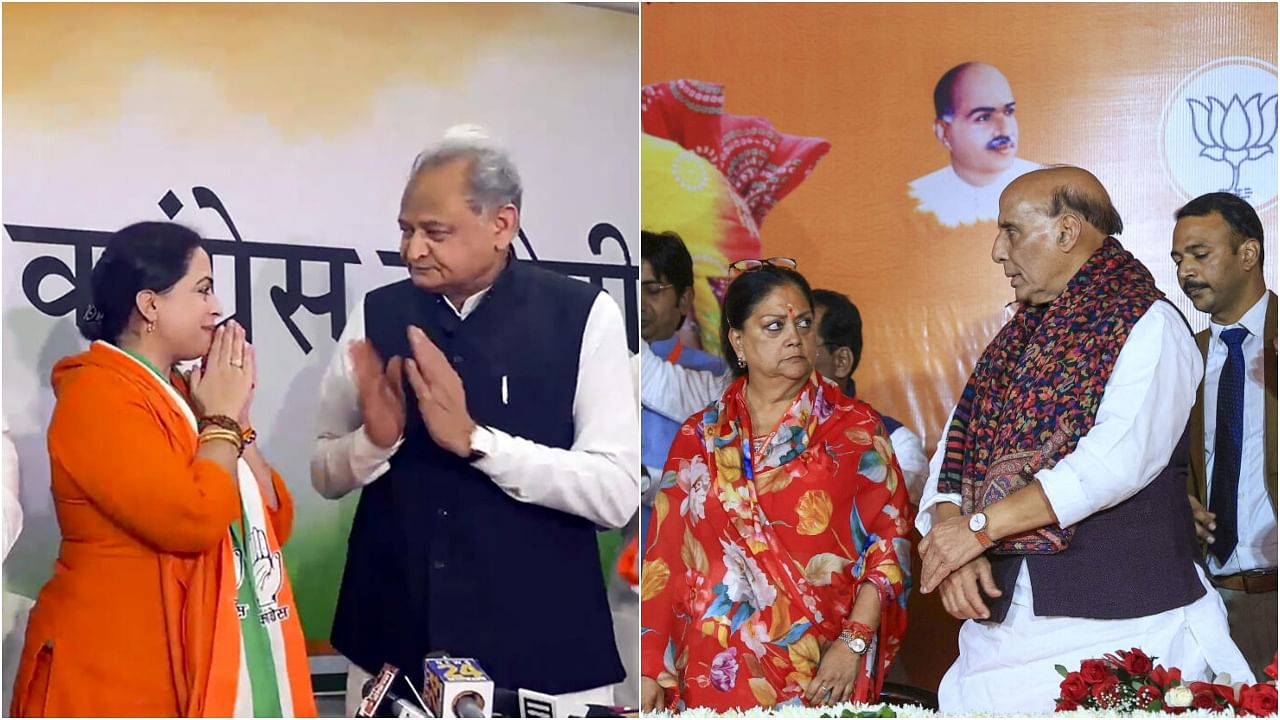
When it comes to giving women political representation, winnability and caste factors come into play, activists say. (Images for representation)
Credit: PTI File Photos
Jaipur: Despite the passage of the Nari Shakti Vandan Adhiniyam Bill in 2023, which was hailed as a game-changer in India’s political landscape, both the major parties in Rajasthan have fallen short on allocating adequate number of seats to women for the upcoming Lok Sabha Elections.
The women’s reservation bill, which saw support from various parties during its passage, ensures reservation of one-third of seats for women in Lok Sabha and State Assemblies.
Not walking the talk?
BJP in Rajasthan has given seats to five women candidates- namely Indu Devi Jatav from Dholpur Karauli (SC), Priyanka Balan from Sriganganagar (SC), Manju Sharma from Jaipur, Jyoti Mirdha from Nagaur and Mahima Vishvaraj Singh from Rajsamand.
Congress, on the other hand, has given seats to only three women candidates Sanjana Jatav from Bharatpur (SC), Sangeeta Beniwal from Pali and Urmila Jain Bhaya from Jhalawar-Baran.
In 2019, only three women MPs from Rajasthan could get to the Lok Sabha. They were Ranjita Koli from Bharatpur (SC), Jaskaur Meena from Dausa (ST) and Diya Kumari from Rajsamand. In 2014, there was only one woman MP, Santosh Ahlawat from Jhunjhunu.
In the 2023 Assembly polls, 50 women candidates were given tickets, out of which only 20 of them could win. There are nine MLAs each from BJP and Congress and two are Independents. The number in this Vidhan Sabha is lower than that of the previous Vidhan Sabha, which saw 24 women MLAs which included 12 from Congress and 10 from BJP, one from the Rashtriya Loktantrik Party and one Independent.
Merely for optics?
Women activists say the parties only provide sops to women and look at them as a vote bank but when it comes to providing adequate political representation, not only the national parties shy away even the regional parties look the other way. Cash assistance, subsidised LPG cylinders, free education, free bus rides are targeted at women voters but when it comes to giving them political representation, winnability and caste factors come into play. This only underlines that political parties only see women as a voting block, offering sops hoping that they swing election results in their favour. But they lack the foresight to give tickets to women.
Arduous path for Nari Shakti
And the much-hyped women reservation bill, Nari Shakti Vandan Adhiniyam cannot be implemented till a census and delimitation exercise, which essentially means that women quota in Lok Sabha and State Assemblies cannot be introduced before 2029.
Tara Krishnaswamy, co-founder of non-partisan collective Political Shakti, which is working for greater political representation of women, told Deccan Herald : “The number of women in Parliament and state Assemblies is pathetic. If one analyses over a period of time and across states, a behavioural pattern emerges - that of no gender justice. They do not generally field women and even if they do, they consider winnability and caste as the most important factors. Except Trinamool Congress and Biju Janata Dal, no political party is really serious in giving political representation to women. BJP has a majority and it can easily send more MPs to the Upper House but it doesn’t.”
On giving tickets to women mostly in reserved constituencies in Rajasthan, Tara says, “National parties mostly give tickets on caste arithmetic, At least 50 per cent of voters in all constituencies are women but no party will give ticket to a woman in a general constituency. They will only give sops to women voters but no real political power. There are hardly women leaders in responsible positions in the party, hardly any national general secretaries or in top slots. There is no effort to inculcate leadership amongst women.”
About the Nari Shakti Vandan Adhiniyam and its implementation, Tara says, "It is an eyewash. The Nari Shakti slogan is meaningless. A 'dead in the water' bill, it also has a 15 year clock which has started from 2023.”
Political activist Yogendra Yadav had tweeted on September 23 that one third seats for women is a political myth.
He had said, "Media reports say Women’s reservation would happen in 2029, This is misleading. Actually it may not happen till 2039. Most media reports miss the real significance of the delimitation clause. Article 82 (amended in 2001) virtually bars delimitation prior to the first census post 2026. That can only be 2031. Most observers don’t remember that the Delimitation Commission takes 3 to 4 years (the last one took 5 years) to give its final report. Besides, the coming delimitation can be very contentious, given the population ratio changes. So we are looking at a report around 2037 or so, that can only be implemented by 2039."